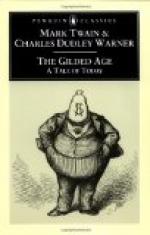“The State must insist upon its objections,” said the District Attorney. “The purpose evidently is to open the door to a mass of irrelevant testimony, the object of which is to produce an effect upon the jury your Honor well understands.”
“Perhaps,” suggested the judge, “the court ought to hear the testimony, and exclude it afterwards, if it is irrelevant.”
“Will your honor hear argument on that!”
“Certainly.”
And argument his honor did hear, or pretend to, for two whole days, from all the counsel in turn, in the course of which the lawyers read contradictory decisions enough to perfectly establish both sides, from volume after volume, whole libraries in fact, until no mortal man could say what the rules were. The question of insanity in all its legal aspects was of course drawn into the discussion, and its application affirmed and denied. The case was felt to turn upon the admission or rejection of this evidence. It was a sort of test trial of strength between the lawyers. At the end the judge decided to admit the testimony, as the judge usually does in such cases, after a sufficient waste of time in what are called arguments.
Mrs. Hawkins was allowed to go on.
CHAPTER LVI.
Mrs. Hawkins slowly and conscientiously, as if every detail of her family history was important, told the story of the steamboat explosion, of the finding and adoption of Laura. Silas, that its Mr. Hawkins, and she always loved Laura, as if she had been their own, child.
She then narrated the circumstances of Laura’s supposed marriage, her abandonment and long illness, in a manner that touched all hearts. Laura had been a different woman since then.
Cross-examined. At the time of first finding Laura on the steamboat, did she notice that Laura’s mind was at all deranged? She couldn’t say that she did. After the recovery of Laura from her long illness, did Mrs. Hawkins think there, were any signs of insanity about her? Witness confessed that she did not think of it then.
Re-Direct examination. “But she was different after that?”
“O, yes, sir.”
Washington Hawkins corroborated his mother’s testimony as to Laura’s connection with Col. Selby. He was at Harding during the time of her living there with him. After Col. Selby’s desertion she was almost dead, never appeared to know anything rightly for weeks. He added that he never saw such a scoundrel as Selby. (Checked by District attorney.) Had he noticed any change in, Laura after her illness? Oh, yes. Whenever, any allusion was made that might recall Selby to mind, she looked awful—as if she could kill him.
“You mean,” said Mr. Braham, “that there was an unnatural, insane gleam in her eyes?”
“Yes, certainly,” said Washington in confusion.
All this was objected to by the district attorney, but it was got before the jury, and Mr. Braham did not care how much it was ruled out after that.




